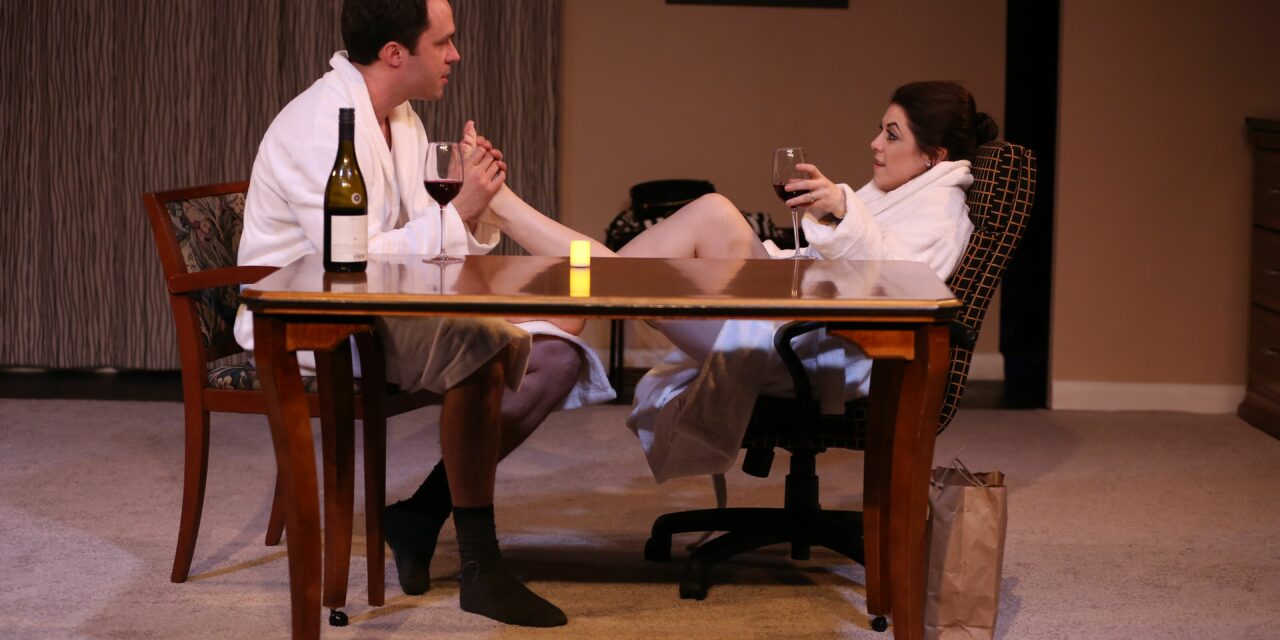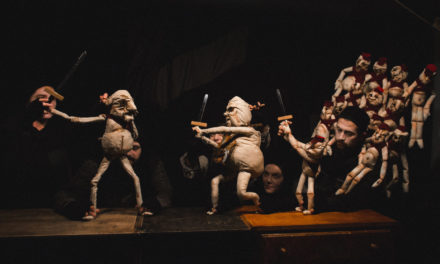In 1977, Margaret Trudeau somewhat famously told People Magazine that “it takes two to destroy a marriage.” She said she’d heard someone say it once, and I suppose, as most aphorisms go, it’s true. But it only takes one to leave a marriage. Someone has to close the door behind them, and it’s the clicking of that latch which echoes through Katherine K. Johnson’s new play at SoHo Playhouse, Fiercely Independent.
In many ways, Johnson’s play is an exercise in mundanity, in the slow, incremental moments of decline until a marriage finally buckles. It may take only a second for someone to decide it’s all over, but it’s the painstaking minutes of circling the drain that — at least from the perspective of an audience watching — hurt the most. And that’s where this play spends all its time.
Julie (Caitlin Gallogly), a young woman you might think was an optimist if ever you saw her on the street, and Robert (Christopher M. Smith), the image of a spark gone out, drowned by middle-aged strife, are at the end of their four-year long marriage. She no longer wants what she has, and he no longer sees what he has at all. Desperate to fix what’s already broken, they embark on a self-imposed assignment: lock each other in a hotel room for 24 hours. No television. No technology. No alcohol (they break that rule) and no name-calling. Leave with a decision.
It’s here where the audience join the couple, inside the interior of a hotel we all know and dread (designed by William E. Cotton). There’s probably some dust around the base of the lamps and a bathroom-bound coffee maker you’d never dare use. The headboards, somehow a part of the wall, never touch the ground, and there’s an office chair next to a table, as if anyone could get work done here.
It’s a compelling idea for a play, and Johnson has striven for simple dialogue that spares the audience the excitement of major fireworks. For a play about the end of a marriage, there’s awfully few arguments — one or two maybe — and not much verbal conflict. The animosity simmers in the moments of silence, not in explosive confrontation. And it’s here that Fiercely Independent may offer an interesting commentary on the process of divorce.
I had expected to arrive and watch that firework show, to witness two people clash in a wonderfully satisfying eruption that breaks a marriage in two. But Johnson, who’s better known as the Tony-winning Broadway producer of A Gentleman’s Guide To Love And Murder, Who’s Afraid of Virginia Woolf and Hair, doesn’t give her audience that satisfaction. Instead, Fiercely Independent, perhaps endeavoring to correct the record on what the end of a marriage actually looks like, stages the last, hopeless reflexes of something that’s already dead.
Julie and Robert have sex. Bored, they play their favorite card game. Hungry, they order their favorite Chinese takeout and read aloud the fortune cookies. They turn on the radio and dance a little, sit in silence and listen, too. For a few long moments, nothing happens, and if you didn’t look at the play’s title you might not know exactly which way the pendulum would swing. And that’s the point — the fireworks are over; now comes the real part. Who’ll say uncle?
As Julie, Caitlin Gallogly is the standout performer of the couple. While Christopher Smith gives a believable performance, inflecting the traces of a once lovestruck husband, Robert — dry and defeated, uninterested in this endeavor and more concerned with settling his wife down (I’m sure a salient comment on the regularity of passive sexism in even most healthy marriages) — is simply a less interesting character. It’s Julie who once believed passionately in the possibility of marriage, and Gallogly, flexible in her characterization, fully inhabits the emotional contradiction of that dilemma.
Of course, there’s the matter of the title. There is a moment, somewhere near the play’s conclusion, when you realize who this play’s about. Ultimately, Julie decides to close the door, to leave and not look back. “I just happen to think I’m wonderful and now I just have to find someone who agrees with me” she says before she exits, the last direction in the play. It’s a moment of catharsis for the audience and for her, a realization that the play may not have dramatized the marriage’s end, but how Julie found her way out of it.
Yet, that thematic nugget might be more powerful if not for a few basic flaws. While Fiercely Independent is conceptually compelling, I’m not sure it makes for good theater. There’s the problem of stake. We meet these two after their marriage has failed. Maybe we see traces of what made them once fall in love, but we certainly never see them happy together. And if we never see them happy, what stake are we to have in their happiness?
Without any dramatic highs or lows, however strategic the mundanity might be, the play strides a little too close to regular life — Johnson’s dialogue often meandering in the way of ordinary, purposeless conversation — to be theatrically exciting. While Julie’s journey might tell the true-to-life experience of a woman coming to terms with the demise of a romantic dream, instead finding strength in her own independence, without much intrigue and little dramatic form the play feels ultimately fatalistic. She may close the door behind her, but I’m left with little passion for what’s beyond it.
This post was written by the author in their personal capacity.The opinions expressed in this article are the author’s own and do not reflect the view of The Theatre Times, their staff or collaborators.
This post was written by Michael Appler.
The views expressed here belong to the author and do not necessarily reflect our views and opinions.


















